Understanding the interests of academics from diverse disciplines to identify the prospective focus for a UK-based transdisciplinary network involving farm-to-fork stakeholders on antimicrobial resistance in agrifood systems: An online survey
McIntyre, K. Marie, Khan, Maha, Betson, Martha, Brunton, Lucy, Degiovanni, Hernan Botero, Desbois, Andrew P, Eltholth, Mahmoud, Hurley, Paul, Morgans, Lisa C, Pearl, John E, Sakrabani, Ruben, Shortall, Orla, Watson, Katharina and Cole, Jennifer (2024) Understanding the interests of academics from diverse disciplines to identify the prospective focus for a UK-based transdisciplinary network involving farm-to-fork stakeholders on antimicrobial resistance in agrifood systems: An online survey. One Health, 19. p. 100884.
|
Text
Mcintyire et al 2024.pdf - Published Version Available under License Creative Commons Attribution. Download (2MB) | Preview |
Abstract
Antimicrobial resistance (AMR) evolution and onward transmission of resistance genes is impacted by interrelated biological and social drivers, with evidence and impacts observed across human, animal and environmental One Health domains. Systems-based research examining how food production impacts on AMR in complex agrifood systems is lacking, with little written on management approaches in the UK that might prevent and respond to this challenge. One approach is the creation of a transdisciplinary network to enhance capacity, capability and collaboration between agrifood-focused disciplines and stakeholders. This co-creation platform for network-wide systems-based activities would reduce inefficiencies in AMR-related activities around agrifood, providing a cross-cutting, cohesive community to deliver transformational guidance on relevant, practical agrifood solutions that add value by reducing AMR, antimicrobial usage and associated costs, and decreasing resultant environmental contamination by prioritising challenges, sharing knowledge and best practice, and co-creating practical solutions with key stakeholders. An online survey determined prospective network focus, structure and priorities, with responses analysed using mixed methods. Survey results suggested respondents have interests in synthesising data using systems-approaches and using certain disciplines such as �social sciences� within network activities. There were disconnects in how and whom to work with on this, with generalised use of �social science/scientists� but lack of disciplinary understanding (e.g., anthropology, sociology) suggesting disciplinary differences awareness-training is useful. A similar generalisation is seen for mathematics/statistics. There are strong interests in working with food system practitioners (e.g., farmers/vets), providing opportunities for farm/field visits/knowledge exchange, and human health, reflecting the need for farm-to-fork understanding of impacts. There were notable mentions of policy/governance, emphasising translational research desires to create meaningful change. Disciplines/fields did not always align with identified interests e.g., systems and implementation science, suggesting the utility of network activity around introducing these disciplines e.g., methodology-focused rather than subject-focused conferences exploring lateral thinking about subjects. We suggest starting by developing understanding of the most important research questions by working with stakeholders, then working back to how we would achieve desirable project outcomes and who else is needed for this.
| Item Type: | Article |
|---|---|
| Keywords: | Antimicrobial resistance, Agrifood, AMR evolution, AMR dissemination, Complexity, Farming, Mixed methods, Systems approaches |
| Divisions: | Agriculture, Science and Practice |
| Depositing User: | Dr Katharina Watson |
| Date Deposited: | 30 Sep 2024 08:58 |
| Last Modified: | 04 Oct 2024 09:45 |
| URI: | https://rau.repository.guildhe.ac.uk/id/eprint/16783 |
Actions (login required)
 |
Edit Item |

